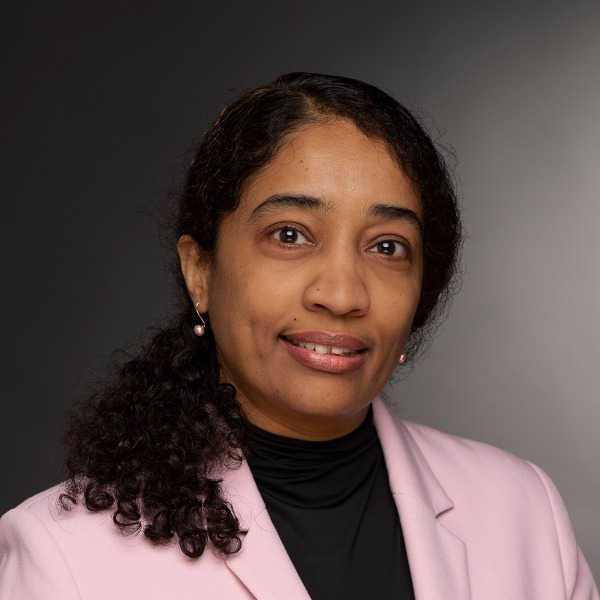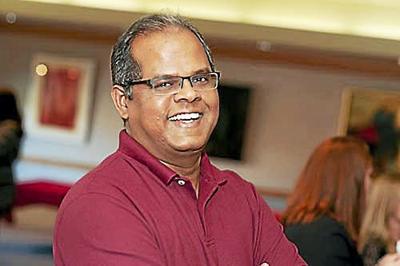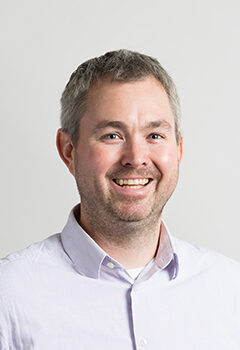Finalists share vision for future of program
The pool for the next Harrington School director has narrowed to three candidates. Kothari photo from rit.edu. Muppidi photo from westhartfordnews.com. Groshek photo from bu.edu.
In search of a new director, the University of Rhode Island’s Harrington School of Communication and Media hosted three public forum discussions to hear from candidates and gain student feedback.
Ammina Kothari, an associate professor of communication and the graduate program director of the communication master’s degree at Rochester Institute of Technology, was the first candidate to host a forum discussion on Friday, April 9.
Kothari was previously the director of the journalism department and has helped reshape the communications graduate program at RIT. She believes that the skills she learned working at a technology-focused school will greatly benefit her at the Harrington School.
“I’m somebody who likes challenges, I grow best when I’m trying to build or work on something,” Kothari said when asked why she wants to join the URI community. “I’m looking for an opportunity where I can bring my skills specifically to a place that is thinking about the next level.”
Kothari said that one of her goals for the Harrington School is for all professors to be knowledgeable in technology, as she believes that it shapes communication today.
She also wants Harrington students to be able to learn more about different programs outside of the school, in hopes that students can gain expertise in the fields they want to tell stories about.
“Harrington students need to be able to work on specializations to differentiate themselves from other students who are more general, to help them in the search for a career,” she said.
Kothari suggested doing this through creating more partnerships with other colleges at URI and encouraging students to take advantage of more general education courses in other fields.
Another one of her goals would be for Harrington “to establish a national and international reputation for graduating storytellers who are experts at telling stories about the environment.”
After talking about her goals, she asked students questions about what they want to see from the new director. She believes that it will be essential for the success of the school to create a better dialogue between students and the director. One student suggested that it would be very beneficial for the director to come to the student film festival that is held at the end of the semester post covid so that students could get feedback on their work.
Sundeep Muppidi, special assistant provost for strategic initiatives, the chair of the institutional review board and a professor of communication at the University of Hartford, was the second candidate to host a forum.
He discussed his educational background and previewed what he plans to bring to the University.
Through his experiences as a student and professor, Muppidi has learned that creating personal, yet professional, student-faculty relationships is key to the success of students.
“It’s not what we write and what we publish,” he said. “What drives us in terms of being an education institution is the change we see in students.”
He continued by saying students gain the confidence they need for their future through faculty mentorship, which he wants to bring to the University.
Student success is linked to higher-level connections with professors, according to Muppidi. He said that student-teacher interactions should be more than just being fed content and being told what courses to take.
Muppidi plans to work one-on-one with students and hopes to show them that they can come to him in times of doubt. This goes along with his plan to make sure each student has a mentor, which they can connect with and look to as a role model.
Muppidi also has had a lot of hands-on experiences, working out of the country with nonprofit organizations and big time Bollywood stars.
One of his past projects includes his documentary, “Seeing the Scientific Light,” which was funded by a NASA grant. He said that he was able to be granted this opportunity because of his collaborative nature.
Muppidi joined this project along with two other men, and the project ended up receiving the $45,000 grant.
“The object of the space grant is to popularize NASA’s work,” he said, talking about what inspired him to join. “That is where I saw an opportunity.”
He said that he knew he had the skills needed to make this documentary great, so he put himself out there and said “Let’s make this documentary.”
Muppidi plans to bring more of these hands-on opportunities to the Harrington School. He said that he will integrate experiential learning into the Harrington curriculum by creating more internship opportunities and out-of-classroom studies.
He plans to set students up for success by taking the school beyond the boundaries of traditional education by incorporating “critical thinking and problem-solving life skills that will allow students to adapt.”
Jacob Groshek, an associate professor in the department of emerging media studies at Boston University and the endowed Ross Beach chair of emerging media research at Kansas State University, was the third candidate to host a forum this week.
During his experience in higher education, Groshek has learned that one of the most important factors for student success is extracurricular opportunities. Bringing attention to these programs would be one of Groshek’s main objectives.
“It is so important for [students] to have engagements, to be able to bring work to the industry and of course to build portfolios and networks,” he said. “In this directorship, I would make sure that the student groups and organizations have the support they need in terms of resources, whether that be financial or in terms of connections.”
According to Grosheck, the Harrington School is at a point of growth that he intends to continue. He said that his experiences as an international scholar will allow the school to partner with a great array of organizations.
At the graduate level, Grosheck has an “ambitious but doable” plan to build new programs that can be completed online or in a hybrid format. He hopes that these opportunities will better students’ experiences studying at Harrington.
“It’s all the more important now to build a curriculum that speaks to far broader concerns and interests than the prototypical graduate program so that students become academicians,” he said. “I have the general viewpoint of allowing students, staff, colleagues and others to really follow their passions and take ownership of the work they are doing.”
In regards to student communication, Grosheck said he has always preferred an “open door policy,” saying that most great ideas at any university are initially proposed by students. He proposed town hall meetings, coffee shop discussions and interactive events to involve students in the University’s decisions.
“I have every intention of being on campus as much as possible, and I think that this sort of visibility and open invitation will go a long way towards helping me to be the most effective director I can be,” he said.
Students who attended any of these forums are asked to fill out this form with their feedback of the candidates.




